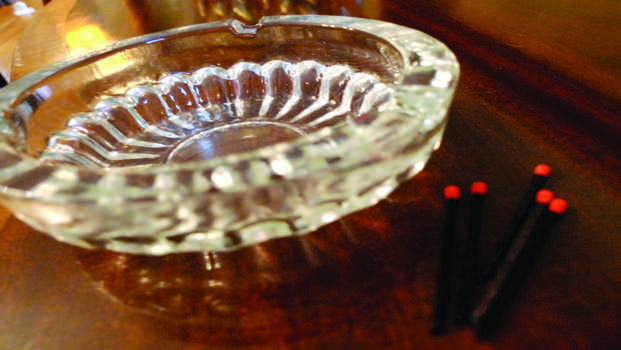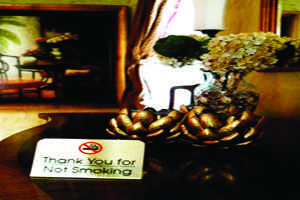In jibe with a growing trend that’s been sweeping the country, North Carolina has joined the ranks of 28 other states who are crusading for clean air in restaurants. After netting a $506.2 million tobacco profit over the course of 2006, North Carolina, the nation’s most prolific producer of nicotine, has passed a law providing that cigarette smoking will be forbidden in almost all 24,000 of the state’s indoor restaurants, bars, and otherwise enclosed eateries. Of the 29 states currently acting under similar bans, only 24 (including NC) went as far as to extend the application of the new law to bars. Any enclosed indoor smoking section, such as in the lobby of a hotel, must also cease to operate if food and drink are regularly prepared anywhere nearby. The legislation, which was signed in May by Governor Bev Perdue, was passed into law on January 2. The regulation has since received a great deal of attention due to the historical significance that the tobacco industry has in the state of North Carolina, where tobacco accounts for 14% of the entire cash crop value and where the country’s first, second, and third largest cigarette manufacturers (Phillip Morris, R.J. Reynolds, and the Lorillard Tobacco Company, respectively) have based their headquarters. Today, there are more than 255,000 employees working in the North Carolina tobacco industry.

At an individual level, restaurant and bar patrons who choose to ignore the indoor tobacco ban are subject to the potential penalty of a $50.00 fine. The responsibility to actually enforce the ban, at a local level, will rest on the shoulders of establishment managers or owners. For failing to successfully stop smokers from lighting up under their roofs, those in charge will be eligible to receive a $200.00 fine, but only after being given two warnings. Seeing the fine as negligible compared to the amount of profit they could pull in by keeping their customers inside, some bar owners have refused to put the mandatory shift in policy into play. Local health departments have been appointed the official responsibility of making sure that nobody smokes inside, as well as the responsibility of handling all complaints related to people who persistently puff away in close quarters. The public is encouraged under the honor system to report instances of failure to obey the new smoking law at http://www.SmokeFree.NC.gov. A toll-free hotline called the N.C. CARE-LINE serves essentially the same purpose. As of Tuesday, January 12, 2010, the Division of Public Health had received a total of 171 complaints to date.
Hordes of habitual indoor smokers are taking the new law as a sign that it may finally be time to break the habit.
The Cumberland County Health Department had received only twelve complains to date, nine of which actually had to do with somebody’s decision to have a square inside. The other three calls were out of concern for the lack of “No Smoking” signs in restaurant windows, which all purveyors of food and beverage are now required to display.
Adam Bliss, the owner of a lounge located in Carrboro known as Hookah Bliss, was devastated when local state representatives declared his business to be unlawful under the newly established limitations and forced him to discontinue his services. Certain hookah bars and cafes, however, have been allowed to go about their business as usual, undisturbed by the Board of Health.
Hookahs are packed with “shisha,” a variation of tea-based tobacco that is dried and chopped up before being infused with flavored molasses. Because the shisha is technically vaporized, in that the tobacco is heated trough a layer of tinfoil by a lit piece of charcoal and no direct heat is applied at any point, hookah lounge owners like J.C. Wright have been able to argue that the ban does not apply. Wright, of downtown Asheville, considers his persistence in providing somewhere for pedestrians to sit and smoke inside to be a form of protest against the new provision. The State Department of Health and Services, however, has thus far found no need to prohibit his operation of the bar. Neither has the Department found it necessary to issue the standard $200.00 fine to any hookah bar so far (even Bliss was not fined). According to J.C. Wright, the people from the Department have actually been cooperative in helping to make sure his cafe can continue running normally, regardless of the restrictions being instituted everywhere else.
Further exceptions to the rule have been appointed to country clubs and organizations of a fraternal order. Private clubs and cigar bars are similarly exempt from the new limitations, though there have already been several complaints regarding regular run-of-the-mill bars propositioning themselves as private clubs in an attempt to dodge the ban.
Hordes of habitual indoor smokers are taking the new law as a sign that it may finally be time to break the habit. Longtime smokers have been breaking their Bic lighters and coming together to help each other quit smoking once and for all. Free classes are even being offered at local hospitals to help struggling smokers with their efforts. One such class, called QuickSmart, is held at Randolph Hospital and promotes a gradual approach to the quitting process, as opposed to the “cold turkey” method popularized by the Nicorette company. According to QuickSmart, weaning yourself away from cigarettes slowly but steadily, called the “warm chicken” method, generates a much greater success rate of smokers who, after quitting, do not pick up the habit again later on down the road.
The public has met the new rules with mixed reviews. Non-smokers, naturally, are excited and supportive. Advocates for human health are particularly pleased about the prevention of second-hand smoke, which can raise an unsuspecting nonsmoker’s risk of getting heart disease by 30% and their risk of getting lung cancer by 25%.

On the flipside, a number of people (particularly smokers) see the ban as being increasingly negative, and it has even been called unconstitutional by some. A common argument is that it should be up to the owner of the restaurant, not the law, whether customers can smoke inside. Smokers are particularly upset with how inconvenient the timing of this all has been, with the January wind freezing their fingers as they wolf down their cigarettes all the way to the filters, inevitably inhaling an icy gust of wind with each drag they take. One very practical compromise that has been suggested is the use of separate ventilation in special smoking areas, so that nobody accidentally inhales somebody else’s cigarette, who would be offended by doing so.
Restaurant owners are divided down the middle in terms of their feelings about the ban. Many have spoken on its behalf, believing it will invite new business or bring back old customers. Rob Redfearn, the owner of the Black Water Grille in Lumberton, thinks that keeping customers from smoking will improve his nightly turnout. He suspects that a great deal of people are actually driven away from the decision to sit down and order a drink at the prospect of having to soak in the smoky atmosphere along with their alcohol.
Others owners are not so pleased, and neither are their customers. In light of the recent changes to the rules, Bill Whitaker and RaDonna Marshall, the volunteer managers of a restaurant called 109, decided to turn the diner into a cigar bar after an outcry of complaints arose among their customers. According to Whitaker the majority of customers claimed it was more important to be ale to smoke inside than to have food to eat. Resultantly, Whitaker and Marshall gave up their restaurant license, meaning they will no longer be allowed to legally sell any food but as a cigar bar, 109 will be entitled to sell tobacco products of all kinds. Smoking, of course, will be permitted everywhere on the premises.


